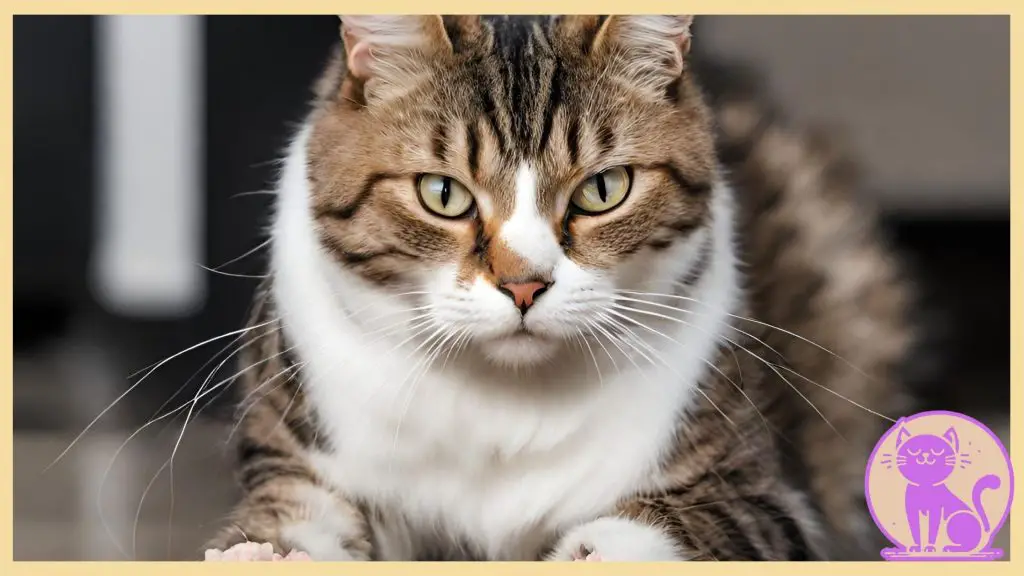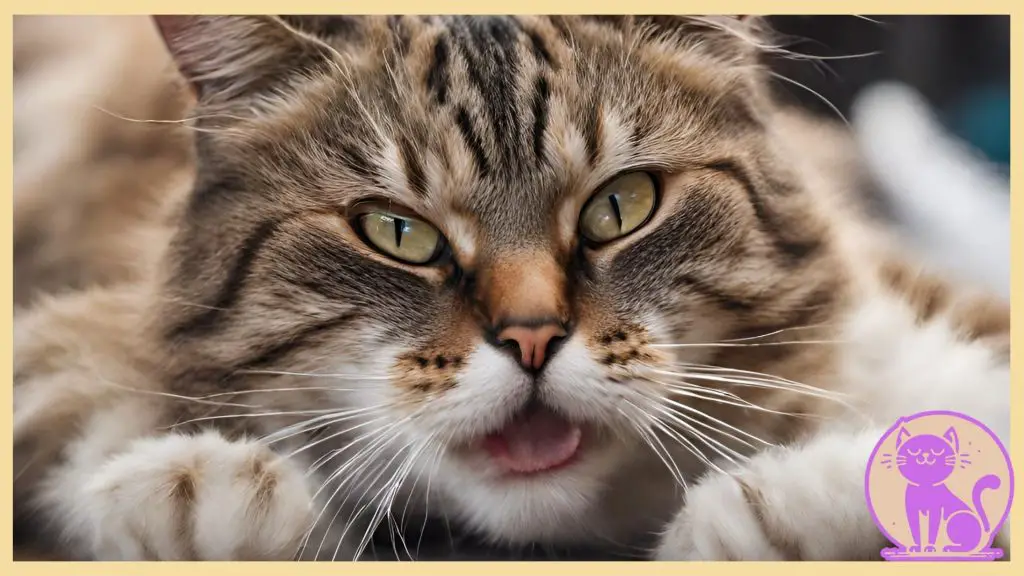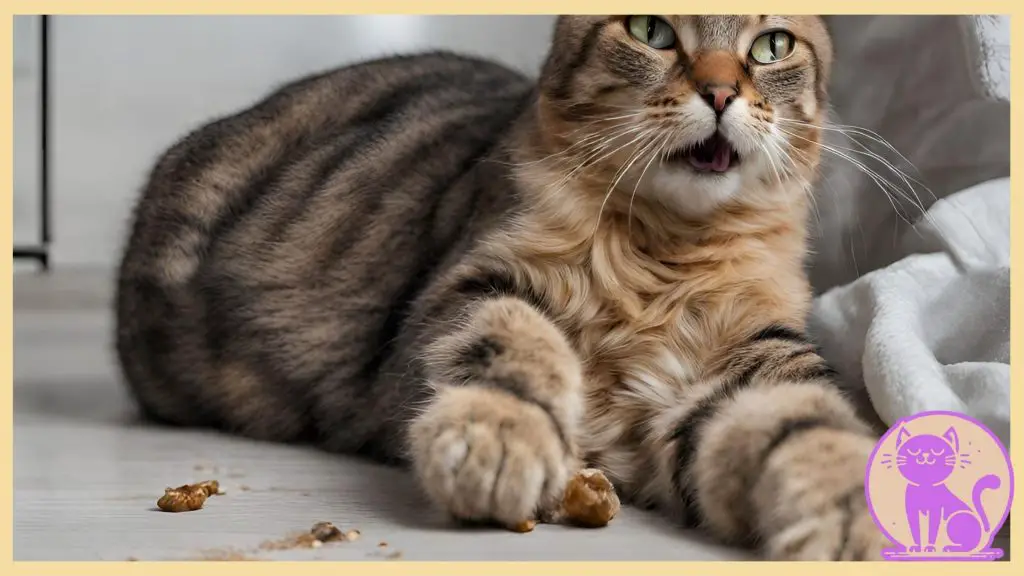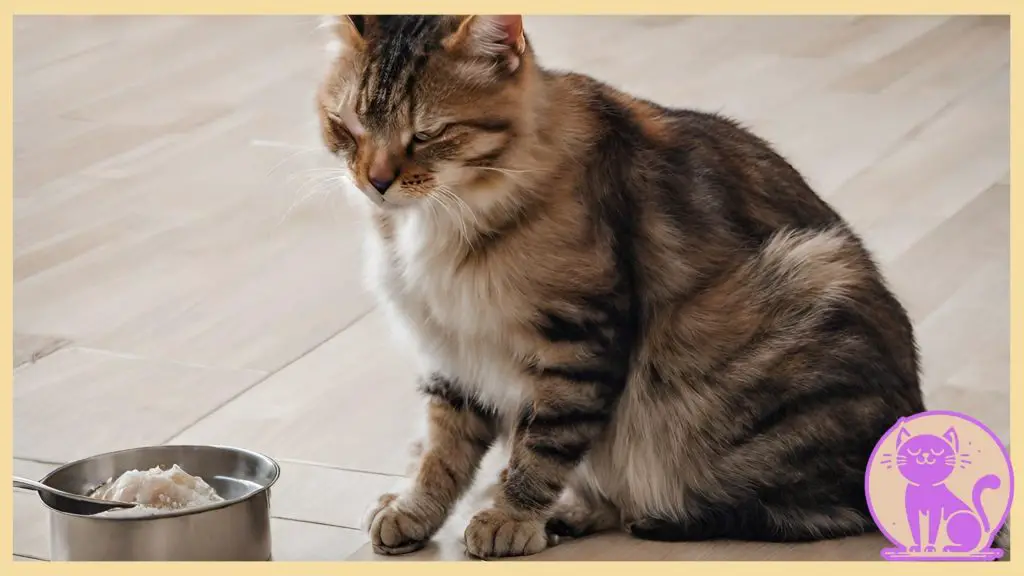Welcome to our comprehensive guide on cat vomiting after eating. If you’ve ever been concerned about your furry friend’s tummy troubles, this article is here to help. We’ll dive into the common causes of cat vomiting after eating, provide helpful tips and remedies, and even share preventive strategies to keep your cat’s digestive system happy and healthy.
Understanding why your cat vomits after a meal is essential in finding the right treatment. We’ll explore various factors, including digestive issues and underlying health concerns, that may contribute to this behavior. Armed with this knowledge, you’ll be able to identify the root cause and take appropriate action.
Identifying the common causes of cat vomiting is the first step in managing your cat’s health. We’ll discuss regurgitation in cats and other potential factors that can lead to gastrointestinal distress. By pinpointing the cause, you can work towards finding effective solutions to alleviate your feline friend’s discomfort.
Treating cat vomiting requires addressing the underlying cause. We’ll explore various treatment options, including both conventional and natural remedies. From medications to herbal supplements, you’ll discover the best ways to ease your cat’s symptoms and promote their overall digestive health.
Prevention is key when it comes to managing cat vomiting after eating. We’ll share valuable tips and strategies you can implement to prevent your cat from throwing up. From dietary recommendations to creating a stress-free environment, you’ll discover a range of preventive measures to keep your cat’s tummy calm and content.
Understanding Cat Vomiting After Eating

Before we delve into the causes and prevention of cat vomiting after eating, it’s important to understand why this may occur. Feline vomiting after meals can be a symptom of various underlying issues, including **cat digestive issues** and **cat health concerns**. It is crucial to identify the reasons for **cat puking** to provide effective care and maintain your cat’s well-being.
Digestive issues such as **feline vomiting after meal** can stem from various factors, such as **dietary intolerance** or **sensitive stomachs**. Cats with pre-existing health conditions may also experience **cat vomiting after eating** due to medication side effects or organ dysfunction. Additionally, stress and anxiety can contribute to gastrointestinal distress in cats, leading to **feline vomiting after meal**.
Understanding the reasons for **cat puking** can help pet owners take appropriate measures to prevent and manage this issue. By paying attention to your cat’s behavior and monitoring their overall health, you can identify potential triggers and make necessary adjustments to their diet and environment to minimize **feline vomiting after meal**.
In the following sections, we will explore common causes of **cat vomiting after eating** and discuss treatment options to address these issues. Additionally, we will provide insights into natural remedies and preventive strategies to help you care for your cat’s digestive health.
Identifying Common Causes of Cat Vomiting
Understanding the causes of cat vomiting is crucial for providing appropriate care and improving your feline companion’s health. Cats may experience vomiting after eating due to various reasons, including regurgitation and other gastrointestinal distress factors.
Regurgitation in Cats
Regurgitation occurs when undigested food is brought up from the esophagus without the usual signs of nausea or abdominal contractions. It is often caused by a dysfunction in the esophageal muscles, making it difficult for cats to properly swallow their food.
Feline Vomiting Causes
Aside from regurgitation, several other factors can trigger cat vomiting after eating. These include:
- Ingesting foreign objects: Curious cats may accidentally swallow items that can obstruct the digestive tract, leading to vomiting.
- Dietary indiscretion: Cats may experience stomach upset and vomiting if they ingest spoiled or toxic food, or if they consume their food too quickly.
- Gastrointestinal infections: Viral, bacterial, or parasitic infections in the stomach or intestines can cause inflammation and vomiting.
- Food allergies or sensitivities: Cats may vomit as a reaction to specific ingredients or proteins in their diet.
- Gastrointestinal diseases: Conditions like inflammatory bowel disease (IBD), pancreatitis, or gastric tumors can lead to chronic vomiting in cats.
- Stress or anxiety: Cats are sensitive to changes in their environment, and stress or anxiety can manifest through vomiting.
It’s important to note that frequent or persistent vomiting should be evaluated by a veterinarian to rule out any serious underlying health issues.
Determining the Right Treatment for Cat Vomiting

Treating cat vomiting requires addressing the underlying cause. In this section, we will explore various treatment options for cat vomiting, including both conventional and natural remedies. Discover effective ways to alleviate your cat’s symptoms and promote their overall digestive health.
When it comes to cat vomiting treatment, it’s essential to identify the root cause. Understanding the underlying issue will help determine the most appropriate course of action to provide relief for your furry friend. Depending on the cause of the vomiting, treatment options may vary.
Conventional Treatments for Cat Vomiting
Conventional cat vomiting treatments are typically prescribed by veterinarians and aim to address specific health conditions or symptoms. These treatments may include:
- Anti-emetic medications: These medications help control nausea and reduce the urge to vomit.
- Dietary recommendations: Switching to a specialized diet may be necessary to address food intolerances or allergies.
- Fluid therapy: In cases of severe vomiting, intravenous fluids may be administered to maintain hydration levels.
- Medications to treat underlying conditions: If an underlying medical condition is causing the vomiting, targeted medications may be prescribed.
- Surgical intervention: In rare cases where an obstruction or structural issue is causing the vomiting, surgery may be necessary.
Natural Remedies for Cat Vomiting
Many cat owners prefer natural remedies for their pets. These remedies can help alleviate symptoms and promote overall digestive health. However, it’s important to consult with a veterinarian before using any natural remedies to ensure they are safe and appropriate for your cat. Some common natural remedies for cat vomiting include:
- Probiotics: Adding probiotic supplements to your cat’s diet can promote a healthy gut flora, which may help reduce vomiting episodes.
- Herbal remedies: Certain herbs, such as ginger or chamomile, can have soothing effects on the digestive system and reduce vomiting.
- Dietary modifications: Switching to a high-quality, easily digestible cat food can help minimize digestive issues and reduce vomiting.
- Stress reduction techniques: Cats can vomit due to stress or anxiety. Implementing stress reduction techniques, such as providing a calm environment and interactive toys, may help alleviate vomiting caused by stress.
| Treatment | Description |
|---|---|
| Anti-emetic medications | Prescribed to control nausea and reduce the urge to vomit. |
| Dietary recommendations | Switching to a specialized diet to address food intolerances or allergies. |
| Fluid therapy | Intravenous fluids administered to maintain hydration levels in severe vomiting cases. |
| Medications to treat underlying conditions | Prescribed to address specific medical conditions causing the vomiting. |
| Surgical intervention | Rarely required in cases of obstructions or structural issues causing the vomiting. |
Natural Remedies and Home Care for Cat Vomiting
If your cat is prone to vomiting, you may prefer to explore natural remedies and home care options before considering medical interventions. These remedies can help soothe your cat’s upset stomach and reduce the frequency of vomiting episodes.
Dietary Modifications
One effective way to manage cat vomiting is to make dietary changes. Consider adjusting your cat’s diet by introducing easily digestible foods or switching to a hypoallergenic or grain-free diet. This can help alleviate gastrointestinal issues and reduce the likelihood of vomiting.
Herbal Supplements
Another natural option to explore is the use of herbal supplements. Certain herbs, such as chamomile and slippery elm, have calming and anti-inflammatory properties that can help soothe your cat’s stomach and reduce vomiting. Consult with your veterinarian before adding any supplements to your cat’s diet to ensure safety and appropriate dosage.
Acupressure and Massage
Acupressure and massage techniques can provide relief for cats experiencing gastrointestinal discomfort. Gentle massaging of specific pressure points on your cat’s body can help relieve nausea and promote relaxation. Research acupressure techniques or consult with a professional in this field to learn the correct methods for your cat.
Avoid Stress and Anxiety
Cats are sensitive creatures, and stress and anxiety can contribute to vomiting episodes. Create a calm and peaceful environment for your cat, ensuring they have a safe space to retreat to when necessary. Provide interactive toys, cozy hiding spots, and engage in regular play sessions to help alleviate stress.
Regular Mealtimes and Portion Control
Establishing a consistent feeding schedule and practicing portion control can help prevent overeating, which can lead to vomiting. Divide your cat’s daily food intake into smaller, frequent meals. This can aid digestion and reduce the strain on your cat’s stomach.
Monitor Food Intolerances and Allergies
Some cats may develop intolerances or allergies to certain ingredients in their food. Keep a close eye on your cat’s diet and monitor if specific foods trigger vomiting episodes. If you suspect an intolerance or allergy, consult with your veterinarian to determine the best course of action and explore alternative dietary options.
Final Thoughts
By implementing natural remedies and home care strategies, you can help manage your cat’s vomiting episodes and improve their overall well-being. However, it’s essential to consult with your veterinarian to ensure the proper diagnosis and rule out any underlying medical conditions. With a holistic approach and tailored care, you can help your cat feel more comfortable and reduce their vomiting episodes.
Prevention Strategies for Cat Vomiting After Eating

Preventing cat vomiting after eating is essential for your feline friend’s overall health and well-being. By implementing a few simple strategies, you can help reduce the frequency of your cat throwing up and promote their digestive system’s health. Here are some valuable tips and recommendations to prevent cat vomiting:
Dietary Recommendations
One of the primary factors contributing to cat vomiting after eating is an improper diet. Ensure that you provide your cat with a balanced and appropriate diet that meets their nutritional needs. Avoid sudden changes in their food or introducing new ingredients that could upset their stomach. If your cat has specific dietary requirements or allergies, consult with your veterinarian to determine the best diet plan.
Portion Control
Overfeeding can lead to cat vomiting. It’s crucial to provide your cat with the right portion size according to their age, weight, and activity level. Follow the feeding guidelines recommended by your veterinarian or on the cat food packaging. Splitting meals into smaller, more frequent portions throughout the day can also help prevent digestive issues and reduce the likelihood of vomiting.
Stress-Free Environment
Kittens are creatures that can easily to be stressed. Create a calm and stress-free environment for your cat during mealtime to prevent vomiting. Ensure they have a quiet and safe space where they can eat without disturbances. Avoid sudden loud noises or household disruptions that could cause anxiety and potentially lead to vomiting.
Additionally, providing your cat with engaging activities, such as interactive toys and regular playtime, can help alleviate stress and promote a healthy digestive system.
By implementing these prevention strategies, you can minimize the chances of cat vomiting after eating and improve your furry companion’s overall well-being.
| Tips to Prevent Cat Vomiting After Eating |
|---|
| Provide a balanced and appropriate diet |
| Control the portion size according to their needs |
| Create a calm and stress-free environment during mealtime |
| Engage your cat with interactive toys and playtime |
When to Seek Veterinary Care for Cat Vomiting

While most cases of cat vomiting can be managed at home, it’s crucial to know when to seek veterinary care. Identifying the right time to consult a veterinarian is essential for managing cat digestive issues and getting the necessary help for cat barfing problems. Here are some situations in which seeking professional care is necessary:
- Severe or Persistent Vomiting: If your cat experiences severe or persistent vomiting that lasts for more than 24 hours, it’s important to consult a vet.
- Dehydration: If your cat is vomiting excessively and showing signs of dehydration, such as reduced appetite, lethargy, or dry gums, it’s a red flag. Dehydration can worsen quickly in cats, so immediate veterinary care is necessary.
- Changes in Behavior: If your cat’s vomiting is accompanied by other concerning symptoms, such as diarrhea, weight loss, or a change in behavior, it’s best to consult a vet. These indications could point to a more serious condition.
- History of Chronic Digestive Issues: If your cat has a history of chronic digestive issues and the vomiting episodes become frequent or more severe, it’s important to seeks veterinary guidance. A vet can help manage and treat the underlying condition effectively.
It’s crucial to remember that each cat is unique, and it’s vital to consult a veterinarian for personalized advice and guidance. Professional help can ensure you receive the necessary assistance in managing your cat’s digestive issues and finding the appropriate solutions to help relieve your furry friend from persistent barfing struggles.
Where to Find Help for Cat Barfing Problems?
If you are uncertain about your cat’s vomiting symptoms or need professional assistance, reach out to your veterinarian or a nearby veterinary clinic. They have the expertise to diagnose and treat various feline health issues, including managing cat digestive issues and helping you and your cat find relief from barfing problems.
| Veterinary Clinic | Contact Information | Website |
|---|---|---|
| Paws Vet Clinic | (555) 123-4567 | www.pawsvetclinic.com |
| Healthy Paws Veterinary Hospital | (555) 987-6543 | www.healthypawsvethospital.com |
| Feline Friends Veterinary Clinic | (555) 789-0123 | www.felinefriendsvetclinic.com |
Common Misconceptions About Cat Vomiting

When it comes to cat vomiting, there are many myths and misconceptions that can lead to confusion and misunderstanding. Debunking these misconceptions is essential for providing better care and ensuring the well-being of our feline friends.
Let’s take a look at some of the most common cat vomiting myths and separate fact from fiction:
Myth 1: Cat vomiting is normal and not a cause for concern
Fact: Cat vomiting should never be considered normal, especially if it happens frequently or is accompanied by other symptoms such as lethargy, loss of appetite, or weight loss. Persistent vomiting can be a sign of underlying health issues and should be evaluated by a veterinarian.
Myth 2: Cats vomit to get rid of hairballs
Fact: While it’s true that cats may vomit occasionally to expel hairballs, not all vomiting is related to hairballs. Cats can vomit due to various reasons such as gastrointestinal disorders, food intolerances, infections, or organ dysfunctions. It’s important to identify the underlying cause of vomiting to provide appropriate treatment.
Myth 3: Feeding a cat grass will prevent vomiting
Fact: While some cats may eat grass to induce vomiting and relieve an upset stomach, it’s not a foolproof prevention method. In fact, feeding cats excessive amounts of grass can lead to further digestive issues or even ingestion of toxic plants. Consult with a veterinarian for appropriate dietary recommendations to address your cat’s digestive health.
Myth 4: Cats vomit because they are trying to punish their owners
Fact: Cats do not vomit to punish their owners or express discontent. Vomiting is a natural physiological response and is usually indicative of an underlying health problem. It is important to approach cat vomiting with care and seek appropriate veterinary attention instead of assuming it is a behavioral issue.
Myth 5: Anti-vomiting medication can solve all cat vomiting problems
Fact: Anti-vomiting medication may provide temporary relief, but it does not address the root cause of cat vomiting. Cats may require further diagnostic tests, dietary changes, or other treatments to effectively manage their vomiting issues. Consult with a veterinarian to determine the best course of action for your cat’s specific condition.
Myth 6: Cats vomit because they are “finicky eaters”
Fact: While it is true that some cats may have specific dietary preferences, chronic or recurrent vomiting is not solely caused by picky eating habits. Cats may vomit due to food allergies, sensitivities, or gastrointestinal disorders. Identifying and addressing the underlying cause is crucial for managing vomiting in cats.
By debunking these common misconceptions about cat vomiting, we can better understand the complexities of feline health and provide appropriate care for our beloved furry companions.
| Myth | Fact |
|---|---|
| Cat vomiting is normal and not a cause for concern | Cat vomiting should never be considered normal and should be evaluated by a veterinarian. |
| Cats vomit to get rid of hairballs | Vomiting can be due to various reasons, and not all vomiting is related to hairballs. |
| Feeding a cat grass will prevent vomiting | Feeding excessive grass can lead to further digestive issues and is not a guaranteed prevention method for vomiting. |
| Cats vomit because they are trying to punish their owners | Vomiting is a physiological response and is not a behavioral punishment from cats. |
| Anti-vomiting medication can solve all cat vomiting problems | Anti-vomiting medication provides temporary relief but does not address the underlying cause of cat vomiting. |
| Cats vomit because they are “finicky eaters” | Chronic or recurrent vomiting is not solely caused by picky eating habits and may indicate underlying health issues. |
Conclusion
In conclusion, cat vomiting after eating can be a sign of various underlying issues, and it’s crucial to identify the cause and take appropriate action. By implementing preventive measures, seeking veterinary care when necessary, and considering natural remedies, you can help your cat enjoy a healthier, happier life.
Remember, always consult with your veterinarian for personalized advice and guidance on managing your cat’s digestive health. They can provide expert recommendations tailored to your cat’s specific needs, ensuring the best possible care and outcomes.
Take proactive steps to promote your cat’s overall well-being, including regular check-ups, a balanced diet, and creating a stress-free environment. With your love and attention, you can help your feline companion thrive and minimize the occurrence of cat vomiting after eating.
FAQ
Q: What are the common causes of cat vomiting after eating?
A: Cat vomiting after eating can be caused by a variety of factors, including dietary indiscretion, food allergies, gastrointestinal infections, hairballs, and underlying health conditions. It’s important to identify the specific cause to determine the appropriate treatment and preventive measures.
Q: How can I treat cat vomiting?
A: The treatment for cat vomiting depends on the underlying cause. In mild cases, fasting your cat for 12-24 hours and then gradually reintroducing a bland diet can help soothe their stomach. If the vomiting persists or is accompanied by other concerning symptoms, it’s best to consult a veterinarian for a proper medical evaluation and treatment plan.
Q: Are there any natural remedies for cat vomiting?
A: Yes, there are natural remedies that can help alleviate cat vomiting. Some common options include feeding a balanced and easily digestible diet, adding probiotics to promote gut health, providing ample hydration, and avoiding stressors that may trigger vomiting episodes. However, it’s always recommended to consult with your vet before trying any home remedies.
Q: How can I prevent cat vomiting after eating?
A: To prevent cat vomiting, it is important to feed your cat a high-quality, easily digestible diet in appropriate portion sizes. Avoid sudden dietary changes and feeding your cat any human food that can be toxic. It’s also advisable to minimize stress, provide regular grooming to prevent excessive hairballs, and keep your cat’s environment clean and safe.
Q: When should I seek veterinary care for cat vomiting?
A: While occasional vomiting may not be a cause for immediate concern, you should seek veterinary care if the vomiting becomes persistent, is accompanied by other worrisome symptoms (such as lethargy, weight loss, or blood in vomit), or if you notice a sudden change in your cat’s behavior or appetite.
Q: What are some common misconceptions about cat vomiting?
A: One common misconception is that hairballs are the primary cause of cat vomiting. While hairballs can contribute to vomiting in some cats, there are many other potential causes. Additionally, some cat owners may mistakenly believe that vomiting is a normal behavior for cats, when in fact it can indicate an underlying health issue that requires attention.








